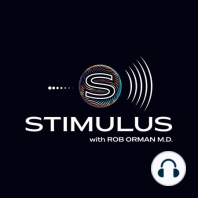62 min listen

46. Strategies to De-Stress Your Nervous System | Before, during, and after intense events
46. Strategies to De-Stress Your Nervous System | Before, during, and after intense events
ratings:
Length:
46 minutes
Released:
Apr 19, 2021
Format:
Podcast episode
Description
We are often witness to, or sometimes in the middle of, traumatic events. Whether it’s a mass casualty or cumulative stress over time, our nervous system can get stuck in an upregulated state. In this episode, we break down: training to handle stressful events, protective strategies to employ during and after traumatic events, the physiology of PTSD, specific techniques to downregulate your nervous system and getting to a place of equanimity. Guest Bio: Ryan Cheney is a mental health therapist, breath work, and performance coach based in Bend Oregon. Our guest on Stimulus Episode 5: The Art of Breathing, Ryan is a thought leader in the field of wellness for health care professions. You can contact him here for further questions and consultations. This episode is in support of World Bicycle Relief -- delivering specially designed, locally assembled, rugged bicycles for people in need. They’ve developed an efficient, innovative, and scalable model to empower students, health workers, and entrepreneurs in rural developing regions with life-changing mobility. Donate here. We will match donations up to $1,000. We discuss: The Las Vegas mass casualty and the wide range of emotional responses of those who were involved [03:50]; While everyone agrees this mass casualty was tragic, some trauma surgeons and emergency personnel described the experience of caring for the victims as deeply fulfilling. These specialists had dedicated their careers training to run a disaster, and when it finally happened, it was game on. For others, the experience brought shock and distress. The fact that trauma is different for every single nervous system [05:50]; What’s traumatic for one person may not be for another. When people have a reaction to trauma (with recurring thoughts, difficulty functioning, etc), that’s their system trying to integrate the event and make sense of it all. It’s important that we normalize some of the response patterns. Factors that might increase the likelihood of having difficulty with trauma include a history of adverse childhood experiences or developmental trauma. Protective factors: taking action (vs. freezing) after a traumatic event and having a strong sense of meaning/purpose. “Life is never made unbearable by circumstances, but only by lack of meaning and purpose.” ― Victor Frankl Training to handle stressful events in a better way [08:15]; You can work on building resilience and learning how to modulate your nervous system. Having the right mindset, understanding your purpose, and incorporating a healthy lifestyle (breathwork, mindfulness, relationships, playtime) can all make a difference. What’s happening physiologically when you have PTSD after a traumatic event [10:40]; Trauma is experienced through sight, taste, touch, sound, smell. It travels through your body into your brainstem and then into the limbic system. When you are exposed to the sensations associated with the initial traumatic event, your limbic system is flooded with the emotions of that event. This deep limbic system holds onto negative things more strongly than positive ones. Over time, for many people, the trauma starts to ‘integrate’ and one's memory of the event changes. Positive thoughts will emerge, like “I made a difference that day”. For others, their nervous system gets stuck. They stay in that trauma response. Strategies that are protective of your nervous system DURING a traumatic event [14:20]; Taking action (vs. the mindset of helplessness) is a protective factor when your nervous system spikes into the sympathetic zone. Giving yourself compassion is important if you’re feeling overwhelmed. You can recite the mantra, “We are doing the best we can, and that’s good enough.” Sending compassion to the people you’re taking care of and wishing them well is another “in the moment” strategy. The importance of PRE-TRAINING so that you have tools to down-regulate
Released:
Apr 19, 2021
Format:
Podcast episode